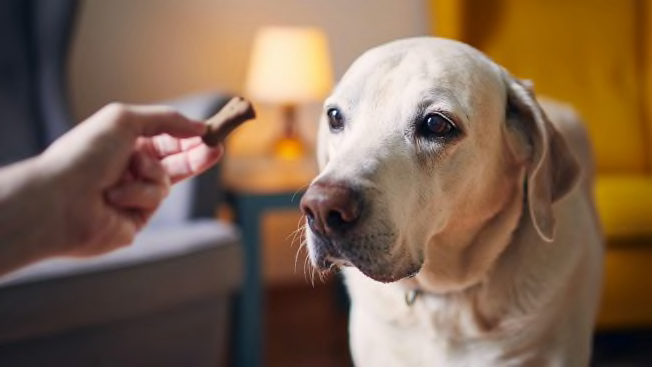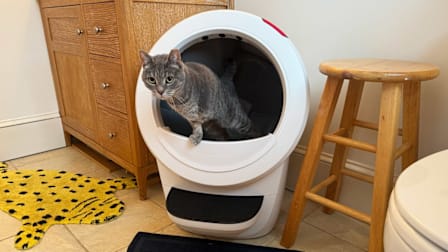How to Prepare Your Pets for Fireworks
Help them feel calm and safe by training them or building a safe space for them beforehand
When you shop through retailer links on our site, we may earn affiliate commissions. 100% of the fees we collect are used to support our nonprofit mission. Learn more.

Fireworks during holidays like July Fourth are an exciting display for many people, but those loud noises and bright lights may not be as joyous for your pets. Fireworks can cause anxiety and stress in some dogs and cats or even prompt them to run away. Even though not all pets are bothered by fireworks displays, there are some that may “experience full-blown anxiety,” says Lisa Lippman, DVM, the director of virtual medicine at Bond Vet in the New York City area.
If your dog or cat gets stressed out by fireworks or if you’re a new pet parent, keep reading. We’ve gathered advice from veterinarians and certified pet trainers to prepare your furry friend for all the pyrotechnics, including training techniques and even medication you might consider giving your dog or cat to keep them calm.
- How Do Fireworks Affect Pets?
- Prepare Your Pet for the Fireworks: Training Medicine Clothing
How Do Fireworks Affect Pets?
For dogs and cats, sudden loud noises can be overwhelming, especially when it’s a sound they aren’t accustomed to. Their hearing is a big factor. “The hearing of dogs and cats is up to three times more sensitive than humans since they can pick up higher frequencies than us,” says Noël Beers, a certified veterinary technician at VCA Madison Animal Hospital in New Jersey.
Loud and sudden noises, such as fireworks displays, can hurt their ears and incite anxiety responses. Their ears are “shaped in such a way that they ‘funnel’ sound, making their hearing much better than that of people,” says Anthony White, DVM, a veterinarian at the NYC Veterinary Group in Long Island City, N.Y. This allows them to pick up sounds in various directions by swiveling their ears toward a sound, Lippman says.
How to Prepare Your Dog or Cat for Fireworks
Pet owners can take multiple approaches to help pets feel safe around July Fourth, according to veterinarians and trainers. The best approach may vary depending on how sensitive your pet is to loud noises. For some pets with just mild stress during fireworks, “training and setting up a safe space in the home may be all that’s needed,” Lippman says. “However, for pets with severe stress, training can take a long time. If an episode of noise anxiety occurs in the meantime, it can interfere with all the progress made during training.” So, Lippman says, it’s important to figure out beforehand how your pet reacts to noises to keep them calm and safe during holidays when fireworks are common.
Start Training In Advance
It’s best to start training your pet as soon as you can. “Training them early on in their puppy years is a good way to prevent noise aversion from starting, which your veterinarian can help you with,” Beers says. “A certified veterinary behaviorist would be helpful if one wants to avoid medications at first.” There are some trainers who work with pets to help them stay calm during fireworks displays as well as any other events that include loud noises, such as thunderstorms, but you can also follow these expert tips from home.
Set Up Positive Associations
“You can change their responses to the sudden sounds by giving them an alternate association before the fireworks,” says Lizbeth Molloy, owner of and dog trainer at Keyrak Dog Club in Staten Island, N.Y. Start a few weeks, or ideally months, in advance by playing fireworks sounds at the lowest volume. While that’s playing, scatter some food or tasty treats on the floor. She says that desensitizes them to the experience as much as possible, and gives them “that alternate association where ‘Hey, big noises mean tasty treats!’ ” Repeat each day and slowly increase the volume of the sounds and continue to reward your dog for being uninterested in it. So when the fireworks come, there will already be some sort of a baseline pattern of response.

Photo: Getty Images Photo: Getty Images
If your pet starts to get anxious, stop playing the fireworks sounds and try again the following day at an even lower volume, Lippman says.
Make good things happen for your cat when the fireworks displays start, Buis says. If they’re hiding, “stop in for some verbal praise and treats every now and then, as long as they don’t seem more upset by it,” Buis says. If they’re not hiding but they’re clearly anxious, keep them occupied by trying play sessions, food puzzles, or even training sessions.
Build a Safe Space
It’s important to make sure that your pets are in a familiar setting to help keep them calm. Molloy suggests setting up a dark and quiet spot in your home. (If they’re crate trained, move the crate to that area.)
Sometimes pets already have a preferred hiding spot—for example, in the bathtub, under a particular bed, or in a closet—that they’ve gone to before during storms or fireworks. If so, Lippman suggests that it may be easiest to set up in this area because they already appear to feel safer there.
In this space, lay some comfort items and some of their favorite treats. If the area has windows, make sure they’re shut, and close any blinds or curtains.
Your cat should also have a safe space of their own, either a room or an area of the house with plenty of hiding spots, Buis says. Make sure their key resources, like food, water, and litter box, are nearby so they aren’t forced to venture out. Buis also says dimming the lights and turning on soft music or white noise can help calm your cat.
Try to Stay Indoors
It’s best to stay home and not go to the beach or a parade. According to Rehner-Fleurant, “loud noises, especially sudden percussive sounds, and unexpected bright lights can be very scary and overwhelming for many dogs.” With all the different sights, sounds, smells, and heat, your dog may become overstimulated.
If you do have your pets outdoors, be vigilant. “Exposure to lit fireworks can potentially result in severe burns and/or trauma to the face and paws of curious pets,” Rehner-Fleurant says. “Even unused fireworks can pose a danger.” According to the ASPCA’s July Fourth safety tips, “many fireworks contain potentially toxic substances, such as potassium nitrate, arsenic, and other heavy metals.”
Don’t React Yourself
It may be hard not to jolt a bit when the fireworks start, but not reacting may help. Molloy suggests that if pet owners don’t respond to the sounds of the fireworks, that will help their dog or cat stay calm, too. “Attitude can really help the dogs be like, ‘Oh, Mom’s not reacting. Maybe this isn’t as important as I thought it was,’ ” she says.
Keep an Eye on Your Pet
Keep your dog leashed and try to be by it at all times. They may be used to going out to go to the bathroom in the yard without a leash, but fireworks can set them off, causing them to run away. Molloy suggests taking your dog out on their walk for that last potty run before the fireworks start.
If you have a fenced yard, make sure to look for any weak spots; don’t rely on it to keep your pet secured when they’re under stress. “When spooked, they can dig under or climb over a fence that would normally securely contain them,” Rehner-Fleurant says. “Once loose, a panicked dog can run for miles without any awareness of where they are, so they’re unable to find the way home once they calm down.”
The noises may cause your pet to run and look for safety. “Every dog is a flight risk if they’re scared,” Molloy says. Just in case, make sure their dog collar tags and microchips have your up-to-date contact information. Molloy also suggests having at least two current pictures of your dog handy: one of them groomed and the other of them wet or dirty. This is a precautionary measure in case your pet runs away.
Consider Anxiety Meds
Pets with acute stress may need prescription medication for their safety and so they’re not scared during fireworks displays. “Training would really only be effective when a pet is not in full-blown anxiety, and medications can help in the training process,” Lippman says.
Each time your pet hears the fireworks, they become more frightened or sensitized, and “then it can get worse over time rather than better,” Flynn says. “So that’s where working with your veterinarian to try to find a medication option that can help reduce their fear and anxiety and stress is a good idea.”
Booking an appointment with your veterinarian will help you determine the best medication based on your pet’s symptoms and medical history.
White at NYC Veterinary Group recommends Sileo and says it’s “our go-to medication for giving your dog noise reprieve.” The active ingredient in Sileo, dexmedetomidine, helps calm dogs by reducing specific reactions in their nervous system.
Some other prescribed medications that veterinarians recommended are gabapentin, a pain medication that specifically has a sedating side effect; trazodone, an anti-anxiety drug; and fluoxetine, also an anti-anxiety drug.
Before giving your dog or cat any over-the-counter medications, verify the products with a trusted veterinarian.
Try Special Calming Clothing
Some owners may find that specific clothing helps their cat or dog feel calmer during stressful situations, like loud fireworks displays. An anxiety vest, such as a ThunderShirt, can help some pets by “mimicking swaddling, which is soothing,” Lippman says.
Anxiety vests are like the equivalent of a weighted blanket for a person. This clothing can be used as an extra precaution for your pets or serve as an add-on to any anti-anxiety medication or remedy pet owners give their pets.
Shop for ThunderShirts here:
Dogs: Amazon, Chewy, ThunderWorks, Walmart
Cats: Amazon, Chewy, ThunderWorks, Walmart
@consumerreports Here's expert advice to help your furry friends deal with all the pyrotechnics this #july4th weekend. #pettok #petsoftiktok #cutedogvideo #petsafety
♬ original sound - Consumer Reports




